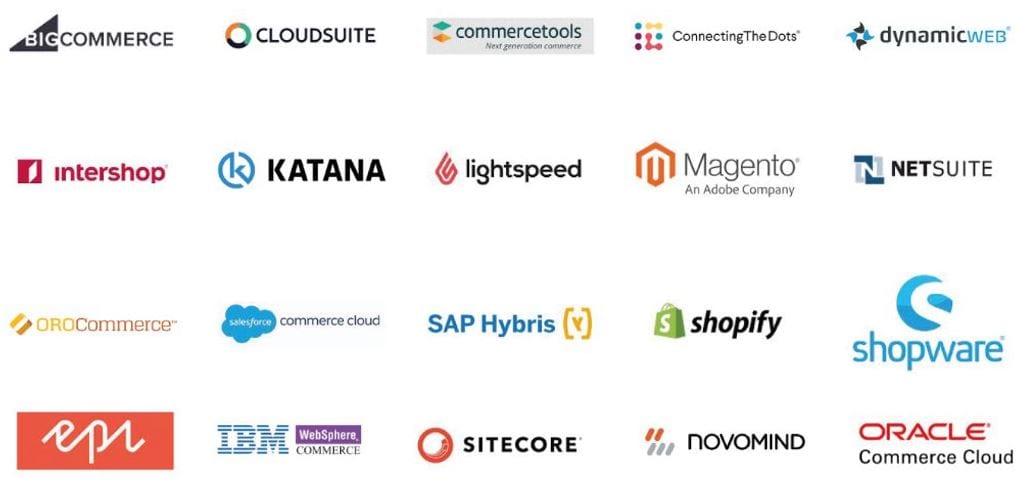Before Ecommerce became the new standard, first in retail and now increasingly also in B2B, choosing a platform was a piece of cake. Major players developed their own software. The range of software that was put on the market in the initial phase to start your own webshop or B2B platform was clear. In the meantime, the situation has changed drastically. Today, Ecommerce is as extensive as it is diverse. As a result of Covid-19, more and more entrepreneurs are taking the step towards digital transformation. And the market for Ecommerce platforms is growing with it. How do you make a responsible choice from the overwhelming range? On Ecom Solutions you can compare all relevant Ecommerce platforms.
Why Compare Ecommerce Platforms?
Why Compare Ecommerce Platforms? That is simple. Starting a webshop or migrating your existing channel to a new web environment presents you with important choices. And one choice is by far the most important: the selection of your platform. That is the foundation of your business. And that better be right first time. After all: you are going to invest money, knowledge and time in your digital company.
So elementary questions arise. For example: which functionalities are essential for my business and which are nice to have with them? Or: how important are aspects such as flexibility and scalability? But also, for example: what are the most important trends in digital business and do I choose a platform that takes this into account now and in the future? And: what do I have to spend and what will I spend on management, maintenance, updates and security?
B2C, D2C or B2B - each market has its own platform requirements
We can go on like this for a while. Because there are many questions to ask and to answer. If you focus on the B2C market, these are different questions than for the B2B market. In retail, for example, there is a lot of emphasis on the look and feel and on offering an optimal User Experience. A platform with a lot of emphasis on UX design fits in with this. In contrast, the digitization of wholesale processes has its own requirements. Consider the importance of efficient management of high product volumes with many specifications and a reliable portal for established customer relationships.
In short, it just depends on your business and budget, which market you are active in, and what your growth ambitions are. Do you serve a niche market or an international market where low prices and fast turnover dominate? Is the possibility of fast, seamless connections with large marketplaces if Amazon or bol.com is a requirement? Are you going for an omnichannel approach? Do you have your own team that does not turn a blind eye to tech challenges or are you completely dependent on your supplier? The range of Ecommerce platforms is so wide and versatile that you can tailor the choice you make completely to your principles, wishes and requirements.
Compare, test, transfer
But the question is, how? Because indeed, there is quite a lot for sale. And every supplier will try their best to convince you that their solution is the best. But how do you test that? And how do you know whether that solution not only works now but is also future-proof? Comparing existing Ecommerce platforms is a good start to make the right selection. Insight into the range and familiarization with the terminology and the most common functionalities provides guidance for taking the right decision step by step. Not only by comparing specific functions - they often correspond to each other - but above all by comparing prices. And by getting a picture of the impact your choice has on your organization and existing technological infrastructure.
Ecom Solutions guides you through the dynamic world of Ecommerce software. Independent and based on the ambition to provide an overview that is as complete as possible, still growing. So you get to know the most important open source solutions. Think of toppers such as WooCommerce and Magento. These 'classics' have now gained quite a few competitors. You will also become acquainted with the so-called SaaS solutions (Software as a Service, also called software on demand) that are growing in popularity. Think of solutions such as the American Shopify or the originally Dutch Lightspeed. SaaS sometimes offers a good combination of flexibility and customization. Finally, you can compare a large number of Ecommerce platforms in the category On Premise solutions. Examples there include SAP / Hybris or Intershop. If you have sufficient in-house IT capacity, this can be a good, but expensive solution.
Compare existing Ecommerce platforms quickly and easily
Comparing existing Ecommerce platforms is just the beginning. It provides first tools for a decision that determines the future of your business. Compare it with selecting a retail property in a prime location or a wholesale branch with efficient warehouse and distribution facilities. As said: it has to be done right first time. For now and for the future. After all, the competition is frenzied and the online consumer is spoiled and is only satisfied with the best possible customer experience. Moreover, the importance of online shopping and business continues to grow now that the corona pandemic has taught us to watch our count in physical interactions.
Ecom Solutions makes Ecommerce platforms comparing possible and low threshold. Our information and consultancy hub is built from years of experience in Ecommerce related IT and Marketing Automation solutions. With the aim: to provide insight into the overwhelming range of Ecommerce software. We offer suppliers an international platform to present products and solutions. We also offer space for blogs and reviews. Do you have any questions or need additional advice during or after making a pre-selection? Connect through the Contact Form with one of our independent specialists.














